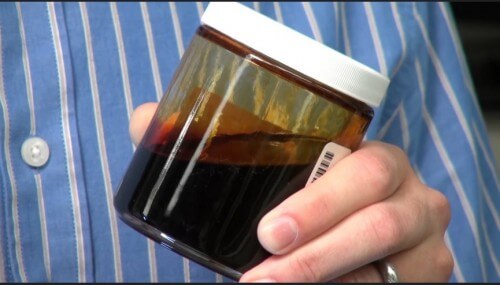As part of scientists' efforts to understand the chemistry responsible for the conversion of plant material into the fuels that drive our vehicles (gasoline and diesel), researchers have revealed that water mixed during the conversion step creates a chemical that slows down the rate of chemical reactions.

[Translation by Dr. Nachmani Moshe]
As part of scientists' efforts to understand the chemistry responsible for the conversion of plant material into the fuels that drive our vehicles (gasoline and diesel), researchers have revealed that water mixed during the conversion step creates a chemical that slows down the rate of chemical reactions.
As part of scientists' efforts to understand the chemistry at work responsible for the conversion of plant matter into the fuels that drive our vehicles (gasoline and diesel), researchers have revealed that water mixed during the conversion stage creates a chemical that slows down the rate of chemical reactions. The research findings, published in the scientific journal Journal of the American Chemical Society, could lead to an improvement in the production processes of biofuels from plants.
The study examined the conversion of bio-oil produced from biomass, such as sawdust or grass, into transportation fuels. The researchers used computer simulations to check what happens to a common by-product obtained in the production of bio-oil. Water, at any stage during the production of biofuels, turns the desired product into an impurity that disrupts and inhibits the reactions leading to the production of biofuels. The results refer not only to water but also to similar liquids used in the production of bio-oil, such as alkalis and certain acids.
The study provides an in-depth look at the desired product phenol (Wikipedia) reacting with catalysts. Catalysts are the substances that chemists use to speed up the reactions that convert plant materials into fuels, reactions that took place in the depths of the earth for millions of years and gave birth to the fossil fuels that humanity uses to produce energy.
"We are approaching the heart of the fundamentals of biofuel catalysis," said one of the co-authors of the article, Roger Rousseau, a researcher at the US Department of Energy's National Laboratory. "The research reveals to us that it is impossible to avoid receiving this impurity (phenol) and therefore we must ensure that it is not formed in quantities that cause disruption of the reaction. Although this is a very basic issue, it highlights to us the ways in which we can help extend the duration of activity of the catalysts used in the production of bio-oils."
In order to convert plant matter into petroleum-derived products - such as gasoline and plastic products - chemists working in the field of biofuels need to understand each step of the process. In the preparation of biofuels, researchers rapidly heat plant material in a process known as pyrolysis (thermal decomposition). In the next step, they use catalysts to convert the oil obtained in the first step into transportation fuels.
The chemical reactions lead to the receipt of starting materials for fuels as well as the receipt of a by-product known as phenol. Phenol by itself is not a big problem in fuels, but it is found in chemical and water containers that undergo a variety of reactions over time in which it is converted into substances called ketones. Active ketones react with each other to form long chains that disrupt the activity of the catalysts and thus interfere with the important reactions. The researchers wanted to know the molecular details regarding the mechanism by which phenol is converted into ketones. In the end, they discovered, the culprit does not fall on the catalysts.
The scientists used computer simulations to simulate the interactions between the phenol and the catalysts and the water to get a detailed picture of the mechanism. In order to examine the role of water in the reaction, the researchers simulated the identical reactions in a vacuum where the solid catalysts are in a gaseous state. In the simulations, the catalyst is actually a piece of metal, nickel or platinum. The phenol or water molecules bounce off or land on the metal surface randomly, where their chemical bonds are broken and re-formed between the different atoms. In this way, the phenol may become a ketone. The researchers found that the presence of water dramatically accelerates the formation of the ketone from phenol. In addition, the water also affects the way the catalyst "activates" its electrons, which affects the effectiveness of the catalyst to accelerate the reaction between the phenol and the hydrogen atoms that "sit" on the surface of the catalyst.
"I was surprised to find out what the role of liquids is in the activity of a metallic catalyst," says one of the researchers. "We know many details regarding these reactions in the gaseous state, and almost nothing in the liquid state. The principles we discovered can also be applied to other reactions involving catalysts.
Video
The original knowledge

One response
Fuel is fuel is fuel...
In Hebrew there is no, there is no inflection of plurals,
Fuel is a whole, such as: information, weapons, bread, etc.
That's why Yok fuels,